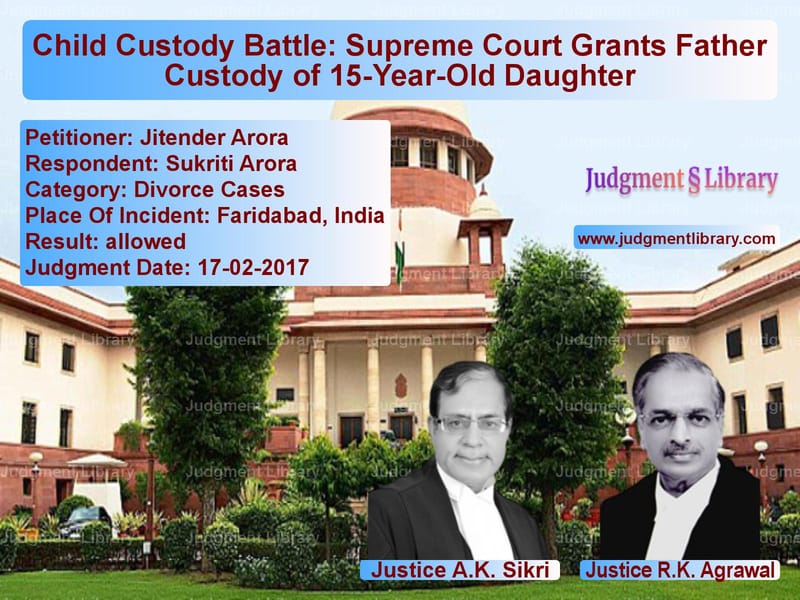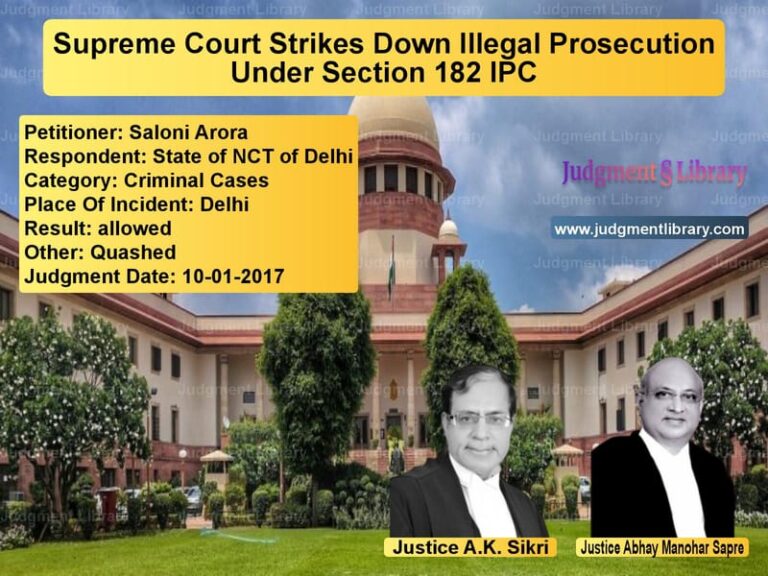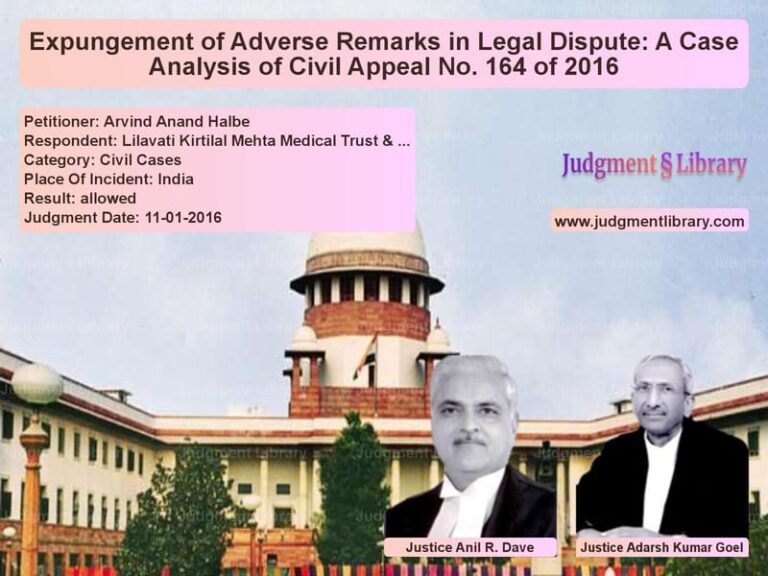Child Custody Battle: Supreme Court Grants Father Custody of 15-Year-Old Daughter
Introduction
The case of Jitender Arora & Ors. v. Sukriti Arora & Ors. was a complex and emotionally charged child custody dispute between two estranged parents who had divorced in different jurisdictions. The legal question revolved around the custody of their minor daughter, Vaishali Arora, who had been residing with her father in India since 2010. The Supreme Court had to determine whether the child’s welfare would be best served by granting custody to the mother or allowing her to continue living with the father.
Background of the Case
The marriage between the appellant (Jitender Arora) and the respondent (Sukriti Arora) was solemnized in 1999 and registered in Faridabad, India. Shortly after marriage, the couple moved to the United Kingdom (UK) in pursuit of better career opportunities. Their daughter, Vaishali, was born in Delhi on January 14, 2002. After her birth, she was taken to the UK, where she lived with her parents until marital discord arose between them.
As their relationship deteriorated, legal battles ensued. The respondent obtained a divorce decree from a UK court, while the appellant also obtained an ex-parte divorce decree in India. The central issue of dispute remained the custody of their daughter, Vaishali.
Chronology of Events
- 2002: Vaishali was born in India but was taken to the UK shortly after.
- 2007: The couple’s relationship soured, leading to allegations of domestic violence.
- 2008: Vaishali was brought to India and admitted to a school in Faridabad.
- 2009: The mother filed a complaint in the UK, seeking the return of her child.
- 2010: The appellant moved to India permanently with Vaishali.
- 2010: The respondent filed a habeas corpus petition in the Punjab & Haryana High Court, seeking the return of her child.
- 2017: The Supreme Court delivered its final judgment.
Petitioner’s Arguments
The appellant (father) argued that:
- Vaishali had been living in India since 2010 and had adjusted well to her surroundings.
- She had repeatedly expressed her desire to continue residing with her father.
- The respondent had obtained UK citizenship for Vaishali without his consent.
- The respondent’s prolonged absence from India indicated that she was not fully committed to raising Vaishali in India.
- The child’s welfare should be the primary consideration, and forcibly uprooting her from her familiar environment would be detrimental.
Respondent’s Arguments
The respondent (mother) argued that:
- As a minor girl, Vaishali required a mother’s care and guidance.
- She had been unlawfully taken away to India by the appellant.
- UK courts had issued orders preventing Vaishali from being removed from the country.
- As the child’s legal guardian, she had the right to make decisions about Vaishali’s future.
- The Punjab & Haryana High Court had already ruled in her favor, ordering the child’s return.
Supreme Court’s Observations
The Supreme Court, after extensive deliberations, noted that child custody cases must be decided based on the best interests of the child. The Court acknowledged that:
“The paramount consideration in such cases is the welfare of the child, not the rights of the parents.”
It further emphasized:
“The views of the child must be given due weight, especially when the child has attained an age of understanding.”
In evaluating Vaishali’s best interests, the Court considered several factors:
- She was 15 years old at the time of the final ruling and mature enough to express her preference.
- She had lived in India for several years and was comfortable with her school, friends, and surroundings.
- She had repeatedly stated that she did not want to return to the UK.
- Her interaction with the mother had not resulted in a change of preference.
Final Judgment
Based on these findings, the Supreme Court ruled in favor of the father and allowed the appeal, thereby setting aside the High Court’s ruling. The Court concluded:
“Forcibly sending Vaishali to the UK against her will would not be in her best interests. Given her age and expressed desire, we find it appropriate to grant custody to the father.”
The Court also noted that the mother would continue to have visitation rights and could meet Vaishali whenever she visited India.
Conclusion
This landmark judgment reinforced the principle that the child’s welfare should take precedence over the legal claims of either parent. It affirmed that courts must consider the child’s preferences, particularly when they are mature enough to express them. The ruling also underscored the importance of providing stability and security in child custody matters, ensuring that children are not subjected to undue distress due to parental conflicts.
Don’t miss out on the full details! Download the complete judgment in PDF format below and gain valuable insights instantly!
Download Judgment: Jitender Arora vs Sukriti Arora Supreme Court of India Judgment Dated 17-02-2017.pdf
Direct Downlaod Judgment: Direct downlaod this Judgment
See all petitions in Child Custody
See all petitions in Judgment by A.K. Sikri
See all petitions in Judgment by R K Agrawal
See all petitions in allowed
See all petitions in supreme court of India judgments February 2017
See all petitions in 2017 judgments
See all posts in Divorce Cases Category
See all allowed petitions in Divorce Cases Category
See all Dismissed petitions in Divorce Cases Category
See all partially allowed petitions in Divorce Cases Category







